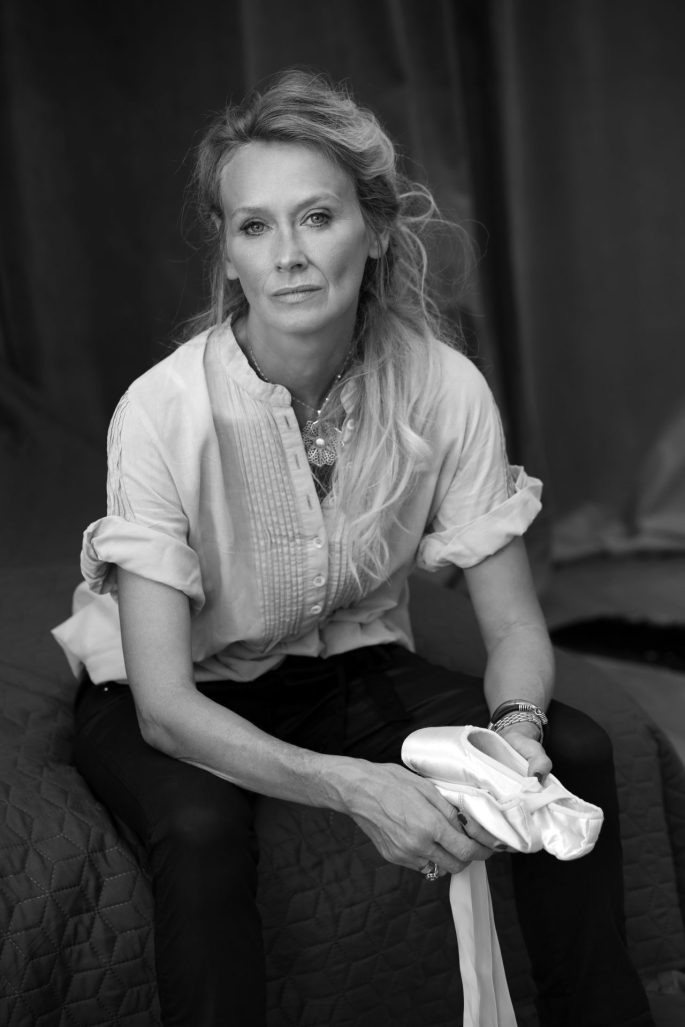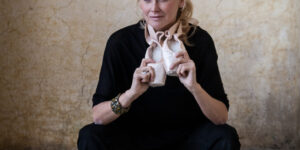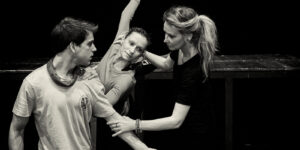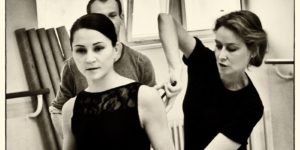Interview with choreographer and dancer Alena Pešková
27. prosince 2023 Veronika Pechová for Dance Magazine
She started as a dancer at the Musical Theatre in Karlín, then briefly in the ballet company of the J. K. Tyl Theatre in Pilsen. For several years she worked as a dancer, choreographer and director without a permanent engagement, and later Alena Pešková founded the dance company Ultra Minimal Ballet. From 2010 to 2019 she was choreographer and artistic director of the ballet company of the F. X. Šalda in Liberec. She works again as an independent artist and collaborates with various theatres in the Czech Republic and abroad. She also organizes her own workshops.
In an interview you said that you started ballet "only" when you were 13 years old. What attracted you to ballet that made you fall into it and it became your life's work?
"Yes, it was rather late. I had to take the difference exams at the conservatory. Until then I lived in a small district town in the east of Bohemia, where I went to the ZUŠ for dance. There we were led by a great teacher and choreographer Eva Veverková. We didn't do much classical dance, but we danced to Pink Floyd. Which was something at that time! But then I saw some international ballet competition with classical variations on TV. I suddenly thought how amazing it would be to combine classical ballet technique with modern dance and modern music... then I also went to the cinema to see the film Flashdance. which I saw about eight times... and it was all over:)"
After graduating from the Dance Conservatory in Prague, you started in 1994 at the Musical Theatre in Karlín and after a year you moved to the ballet company of the J. K. Tyl Theatre in Pilsen. What were your professional beginnings?
"Well, at the conservatory, I went through classical dance with my ears scratched, so to speak. I had a big handicap caused by a late start and my physical disposition was also not so good. In this respect my self-confidence suffered a lot. I felt better in modern dance techniques, acting and even then I was tempted to do something of my own. In my final year I prepared a choreography with my classmates, which we were allowed to dance at the Estates Theatre for our graduation performance. When I joined HDK I had more time to think. I was going to the hall and discovering that it also depends on what I want to show the audience, from what angle, and that you can make a virtue out of a lack to a certain extent ... and that if you want to express a certain emotion and you can unbind your body, you can do wonders. Then, when the smaller, bigger and title roles started coming up in Pilsen, I knew I had something to offer the audience. Also, I had already gone through all the workshops on modern dance techniques at the conservatory, made my own systems and then hacked them with other suggestions."
Since 1999 you have worked as a dancer, choreographer and director without a permanent engagement and later you founded the Ultra Minimal Ballet. What led you to found it?
"It's true, in 1999 my husband (David Pešek Dvořák - also a dancer at that time) and I left our engagement in Pilsen to go freelance. Which was not very common for dancers at that time. We paid for training in Laterna Magica and elsewhere to keep in shape. We were guests at the State Opera Prague and the Pilsen theatre, but we could travel. For example, with the Magic Flute directed by Mr. Bednárik and choreographed by Libor Vaculík we saw a part of the world. We also went to Japan, where we were watched by 3000 spectators who clapped uncritically whenever I entered the stage in tiptoe with a brilliant crown on my head. And I think that was the moment when I wanted to do something that would be watched by maybe only 30 people, but they would be connected to the dancers, close to them body and soul, and would swallow their blood, sweat and tears. We did our first performance at the Blues Cellar, which was a music club that my husband ran after he stopped dancing. Then we had a full-length performance at the Malostranská Beseda."
During your ballet career, you were the Lady with the Camellias in the ballet of the same name, Lisette in Vain Caution, Rebecca in Carmina Burana, Titania in A Midsummer Night's Dream. Did your dancing dreams come true? Don't you ever long to be on stage again as a performer?
"Honestly, sometimes I do. And it's also a long-standing trend that doesn't seem like an odd path to me. I mean, older dancers on stage. It's also contemporary dance forms and repertoire that goes against such a trend. An older dancer certainly can't maintain the technique they had when they were in their twenties. The technique will change as much as the experience or the dynamics. The dynamics, for example, when you're in your twenties, you feel like you have to tear down the set, you're cutting into everything... but it can also bore the viewer pretty badly... if they don't experience the calm without the storms. I don't put my feet behind my ears anymore, or jump two meters high... if I ever did: )... but when I work with dancers, I feel I have something they are still figuring out... I know how to use the power of the fullest point, I know when to cling in a partner and when and how to multiply the power the partner sends me, I know how to "mark full" and such things come through many experiences in the room and on stage. Back in the fall, I danced Mommy in The Little Match Girl with UMB... it was choreography I had put on a few years ago, and frankly, I didn't feel very comfortable in it anymore. So it always depends... Showing the strengths that I have right here and now... I'm not resisting it at all, but if I'm going to go it alone I really don't know."
For nine years you were choreographer and artistic director of the ballet at the F. X, Šalda Theatre in Liberec, where you created successful dance productions - Periferie, The Nutcracker, Cinderella, Gazdina roba, Romeo and Juliet and (S)creation. How do you remember this fruitful nine-year period?
"Only in a good way. It's given me a lot of experience. Dramaturgically, I have fulfilled many dreams. I've met beautiful people. But time is up. I felt I needed to move on."
You are again working as an independent artist and collaborating with various theatres in the Czech Republic and abroad. In 2021 you prepared a dance drama The Cross at the Brook with the Prague Chamber Ballet, and for the South Bohemian Theatre in České Budějovice you wrote the libretto, choreographed and directed the ballet Tristan and Isolde (2022). Are you preparing a new project?
"I'm currently off work - so there's no deadline. Which I've been wishing for a long time so that I could get back into something with UMB and my project that I would like to offer. But I've been blaspheming a little bit. As no one is pressuring me, I've been pushing everything off and doing things I couldn't do because of work - getting my driver's license, cooking, and remodeling my apartment :)... I've got a lot of ideas in my head, I'm fidgeting in front of the mirror... and I'm going to record and implement it all soon too! But actually there is one thing I'm really looking forward to, which has a deadline. And that's my workshop. It's only my second time. I think we all had a great time last year. The workshop is called, Start the Season, and the subtitle is Emotion in the Body and Body in Emotion. For example, after training together we explore what happens to the body when it is left with the same building material (movements) and the emotion changes, which then deforms it. How each emotion changes the dynamics of movement, and the perception of time. When to use music as a map of time and when to use it as background."
You're mainly involved in choreography. How does your work as a choreographer fulfill you? Is it the possibility of creating your own world on stage, where people act, move and look as only you see it?
"I think you've summed it up quite accurately, with the addition that I would like the audience to join me in the play."
You also choreograph not only for dance performances, but also for operas. How do you work with non-dancers, people who are not familiar with dance techniques?
"I always have a great time working with great people. And when I'm prepared for the technology they (don't) have, everything goes like clockwork. I take advantage of their strengths (sometimes it's enough to observe their civilian movements and gestures) and then they can open up and show what they have in them. It is then a great inspiration for me. We all step out of our comfort zone, as they say everywhere nowadays. The condition is that mutual openness."
Can you relax? What does the word relax mean to you?
"I can. My favorite thing is passive relaxation. Sleep comes first. Then also staring at the wall (some call it meditation:)) and reading. Of those active rests: hmmmm... I only run when I miss the tram - but I want to change that!, I only swim when someone puts the sea or lake in front of me - but I want to change that! Strangely enough, I dance, the kids make fun of me and I tell them it's my job - and then I realize I'm probably not resting. And then there's one indulgence - ironing. I listen to audio documentaries on it, stories. It looks like I'm working hard, but it's relaxing in a way."
Veronika Pechová
for Dance Magazine




Comments are closed.